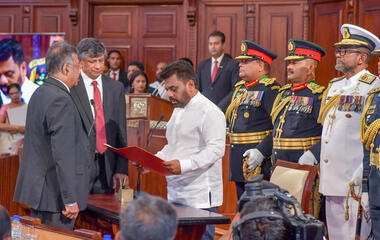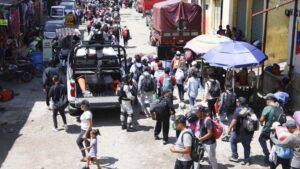https://www.facebook.com/plugins/share_button.php?href=https%3A%2F%2Fwww.universityworldnews.com%2Fpost.php%3Fstory%3D20240927170758911&layout=button_count&size=small&mobile_iframe=true&width=106&height=28&appIdIn a landmark political shift, Sri Lanka’s recent presidential election brought a Marxist-leaning party to power for the first time since the country’s independence in 1948. Students, school teachers, university lecturers and young voters wanting a break from the old political order played a crucial role in his victory.
Anura Kumara Dissanayake’s election victory following the 21 September poll reflected the deep discontentment of Sri Lankan voters, who had turned away from the two dominant political parties that governed the island nation for decades.
A female school teacher, who wished to remain anonymous, told University World News most teachers at her school wanted change.
“After 76 years of independence, we are still a developing country. Both main parties that have ruled [Sri Lanka] are responsible for this. People now want to try a new party, not the ones that failed to deliver,” she said.
Social media was instrumental in mobilising these groups, despite some misinformation, according the interim report of the Asian Network for Free Elections monitoring group published this week. The group’s election observers described the Sri Lankan election as “largely peaceful and orderly”.
After a closely contested race, which went to a second round of counting, Dissanayake won with 5.74 million votes or 42%, surpassing his main rival, opposition leader Sajith Premadasa with 32%.
Dissanayake’s victory is remarkable given the fact that he only secured 3% of the vote in the previous presidential election held in 2019. His current vote share marked a 1,200% increase in the number of votes he secured.
The new president, who leads the Marxist-leaning Janatha Vimukthi Peramuna (JVP)-National People’s Power (NPP) coalition, has promised reforms to improve education access and quality.
But political analysts question whether the new president can balance his party’s push for educational reforms with the demands of student unions who oppose privatisation of higher education, and he may face mounting unrest as he tries to implement these changes.
Harini Amarasuriya, a member of the NPP and a prominent academic, was appointed prime minister – the first South Asian woman without a political family background to hold the position. She holds degrees from Delhi University in India, Macquarie University in Australia and a doctorate from Edinburgh University, United Kingdom.
She is known for her research into youth unemployment, gender inequality, and inefficiencies of the Sri Lankan education system.
Amarasuriya was also appointed education minister and holds the ministry portfolios for justice, labour, industries, science and technology, health, and investment in the new government.
Amarasuriya’s appointment signals a potential shift in the government’s approach to education and social reform.
On becoming education minister this week, she issued an immediate directive to halt the longstanding practice by school officials of inviting politicians to school functions. The aim is to free education from political influence and ensure a focus on students and their academic environment, she said.
Amarasuriya was among those urging the withdrawal in 2021 of the proposed Kotelawala University Bill, intended at the time to turn a defence institution into a fully functioning university under the defence ministry. Protesters of the bill expressed concerns it could lead to the privatisation of public higher education and the militarisation of universities. The bill was later shelved.
Shift in position on private education
Today, the position of Amarasuriya’s party has shifted towards more private funding of education and was a striking element of Dissanayake’s election campaign.
Historically, the JVP and its NPP coalition partner were staunch opponents of education privatisation and, alongside the Inter University Students’ Federation (IUSF), resisted any moves towards the establishment of private universities in Sri Lanka.
Dissanayake himself led protests in 2012 against the private university bill and again against the South Asia Institute of Technology and Medicine (SAITM), the country’s first private medical university.
However, his 2024 election manifesto acknowledged high demand for private education due to limited public funding for education.
The country’s public education infrastructure has been severely affected by the country’s economic crisis, with many institutions facing rising costs, staff shortages, and disruptions due to fuel shortages and power cuts in 2022, leading to the increasingly prevalent view that Sri Lanka’s struggling education system could benefit from greater private sector involvement.
Dissanayake’s manifesto proposed the creation of an independent regulatory body under the Ministry of Education to oversee the quality and fees of private educational institutions.
Rashmika Chamod, convener of the Medical Faculty Students’ Action Committee criticised the NPP for reintroducing education privatisation despite public opposition.
“The NPP manifesto says it will establish an independent regulatory unit to oversee the quality of private educational programmes. They are now agreeing with education privatisation,” Chamod told University World News, adding it undermined the country’s Free Education Policy established in 1945.
“As a student movement we are ready to lead the public and students against the government’s plan for education privatisation,” he stressed.
Student resistance
Any move towards private education is likely to face significant resistance, particularly from the IUSF, which, although broadly supportive of Dissanayake in the past, remains firmly opposed to any form of education privatisation.
IUSF argues private education exacerbates inequality by giving wealthier students access to better resources and opportunities while leaving behind those in the public system. “We need to expand free education, not sell it off,” IUSF convener Madhushan Chandrajith told University World News the week before the poll.
IUSF resistance could lead to renewed student protests, and tension between the IUSF and NPP as it is unlikely to back down on its long-held stance. Dissanayake’s party has traditionally allied with student movements.
Dissanayake has appointed a former IUSF convener, Najith Indika, as the new director-general of the presidential media division in what many said was a surprise move.
In 2014 Indika also led major protests against SAITM, also known as Malabe Private Medical College, and opposed the Higher Education Ministry’s plan to increase the quota of international students.
The road ahead
Dissanayake’s presidency comes at a critical time for Sri Lanka’s education system. The sector has been in turmoil since the 2022 economic collapse, which badly affected schools and universities.
Many lecturers left the country due to low pay and poor working conditions, with 1,200 academics emigrating between 2022 and 2023 alone. The new government faces the immense task of addressing these issues while also modernising the education system to meet the needs of a rapidly changing society.
In his manifesto Dissanayake promised an increase to university students’ stipends known as Mahapola Scholarships, which support around 60,000 students, and to address salary disparities among educators.
He also pledged to make teaching one of the highest-paying professions in the country, helping to stem the brain drain of academic talent from Sri Lanka.
Addressing the nation on 25 September, Dissanayake emphasised the government’s commitment to improving living standards and vowed to ensure every child has access to quality education.
“Our goal is to improve the standard of living for the people of this country. We are implementing practical programmes to alleviate the heavy burdens faced by our citizens,” he said.
He added: “No parent in this country should have to worry about their child’s future. Every parent deserves the right to provide their child with access to quality schools and education.
“We are fully committed to securing the future of the next generation by ensuring excellent education for all children. By fostering knowledge, attitudes, and skills, we are building a promising future for the young generation of our country.”
However, the upcoming general election on 14 November 2024, following Dissanayake’s decision this week to dissolve parliament, adds further uncertainty./universityworldnews.com





More Stories
UN summit outcome shows higher education has work to do
New EU-funded programme to support threatened academics
Florida State University and Tallahassee Memorial HealthCare break ground on academic health center